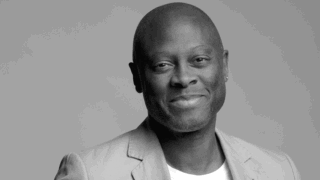The Lavin Agency Speakers Bureau
A speakers bureau that represents the best original thinkers,
writers, and doers for speaking engagements.
A speakers bureau that represents the best original thinkers,
writers, and doers for speaking engagements.
Anxiety may feel bad, but it’s actually good for us—and for our productivity, creativity, and wellbeing.
With stress and burnout spiking, many of us believe that our lives would be better if only we were less anxious. But Dr. Tracy Dennis-Tiwary says our anxiety is actually good for us, even though it feels bad. Anxiety helps us focus, create, and plan for the uncertain future. As a clinical psychologist and author of Future Tense, Tracy argues that we’ve been looking at the anxiety crisis all wrong. In highly practical talks, she provides a radical new framework for managing anxiety—our brains’ response to uncertainty—and using it to our advantage. “When we stop rejecting anxiety,” she says, “we will be better able to channel it, manage it, and use it to prioritize what matters to us in life.”
Tracy Dennis-Tiwary has delivered the riveting read we all need to help us learn to worry well instead of worrying less.Adam Grant, #1 New York Times bestselling author of Think Again
Tracy Dennis-Tiwary is the bestselling author of Future Tense, which offers a revolutionary new way of understanding, managing, and leveraging anxiety. A brilliant psychology and neuroscience professor, Tracy argues that we can’t ever eradicate anxiety completely, and more importantly, that we shouldn’t try to. Anxiety evolved to help us imagine, plan, and prepare for tomorrow—it makes us more future-oriented and persistent so we can chase our goals. If we can learn to experience the healthy aspects of anxiety, and work through the difficult parts, we’ll be better equipped to face our uncertain future with hope, tenacity, and courage.
In her book Future Tense: Why Anxiety is Good For You (Even Though it Feels Bad), Tracy makes the case for anxiety: why we need this difficult emotion, how our current view of it is unhelpful, and how we can shift our perspective on anxiety so that we can better use it as the advantage it evolved to be. Tracy draws on real-world stories as well as cutting-edge research to help us adopt a new mindset about anxiety. Future Tense is an invaluable resource for anyone looking to manage anxiety in the workplace, in school, or in the context of digital technology. Angela Duckworth, New York Times bestselling author of Grit, says, “If you’re feeling more anxious than usual and, on top of that, feeling anxious about feeling anxious, then this book is for you. Clear, practical, and incredibly readable!”
Tracy is a professor of psychology and neuroscience and director of the Emotion Regulation Lab at Hunter College. She is the founder and CSO of Wise Therapeutics, where she translates neuroscience and cognitive therapy techniques into gamified, clinically validated digital therapeutics for mental health. She has published over 100 scientific articles and delivered over 400 presentations at academic conferences and for corporate clients. She has been featured in a wide range of media, including The New York Times, The Wall Street Journal, ABC, CBS, CNN, NPR, The Today Show, and Bloomberg Television.
Tracy stayed long after our event to speak with guests, sign their books, and engage with our guests in ways that keynotes often do not. She is incredibly personable and approachable, and so very knowledgeable, with a charming touch of humor and humility. I highly recommend this incredible speaker to audiences far and wide. Her work is a game changer!
Frameworks of Tampa BayDr. Tracy was wonderful, and all who attended raved about the power and usefulness of her message.
Wilmington Friends School
Author of The Loop: How A.I. is Creating a World without Choices and How to Fight Back NBC News Technology Correspondent Former Editor-in-Chief of Popular Science Magazine AI Strategic Advisor to Fortune 500 Companies

Founding President, PlusCo Venture Studio Former Chief Creative and Innovation Officer, Cossette

Speaker on AI and Education Executive Director of the Stanford Accelerator for Learning

Speaker on AI and Education Executive Director of the Stanford Accelerator for Learning

Harvard Business School Behavioral Science Professor "40 Under 40 MBA Professor" Author of TALK: The Science of Conversation and the Art of Being Ourselves

Author, Ordinary Magic Co-Director, Dweck-Walton Lab at Stanford Professor of Psychology, Stanford

Author of Grit, the #1 New York Times Bestseller | Pioneering Researcher on Grit, Perseverance, and the Science of Success

2024 Nobel Prize Winner | 3rd Most Cited Economist in the World | Bestselling Co-Author of Why Nations Fail and Power and Progress

Harvard Business School Behavioral Science Professor | "40 Under 40 MBA Professor" | Author of TALK: The Science of Conversation and the Art of Being Ourselves

#1 New York Times Bestselling Co-Author of Abundance | Host of thePlain English Podcast | Founder of the Substack Derek Thompson

#1 New York Times Bestselling Author of How the Word Is Passed and Above Ground | The Atlantic Staff Writer

We tend to think of anxiety as an obstacle at work, assuming that it impedes our focus and productivity. But psychologist and author Tracy Dennis-Tiwary says we’re looking at this all wrong: anxiety is a superpower that we can use to become smarter and more tenacious in the face of challenge.
In this talk on anxiety in the context of workplace mental health and burnout, Tracy discusses how our beliefs and discourse about anxiety unintentionally set us up for failure, blocking us from managing anxiety effectively, and preventing us from learning how to leverage anxiety to our advantage. She distills learnings from cutting-edge scientific studies and shares stories from her personal experience as a digital health technology entrepreneur to show how we can create a paradigm shift in our approach to anxiety. She provides practical, actionable advice for “flipping the script” on anxiety, called the FLIP method.
This talk is a must-listen for workers at all levels. You will come away better able to distinguish healthy from unhealthy anxiety, manage and let go of anxiety when it’s getting in the way, and leverage anxiety as an advantage that increases persistence, grit, and creativity.


Educators are at the frontline of kids’ struggles with anxiety—whether it’s social anxiety, performance anxiety, or just plain feeling overwhelmed. The crisis is only growing—by the time kids turn 18, over 30% of them will have experienced debilitating anxiety. That’s more than 10 million in the United States alone. Isn’t this statistic a clear mandate that we must protect and buffer our youth against anxiety? But this would be a mistake. Research shows that avoiding and “fixing” anxiety-provoking situations may comfort anxious children in the moment, but prevents them from learning to cope in the long run.
In this talk on anxiety in the context of education, anxiety researcher and bestselling author Dr. Tracy Dennis-Tiwary discusses new perspectives on child anxiety. She provides a blueprint for how, by challenging our long-held assumptions, we can help kids and teens manage anxiety better, learn from it, and leverage it to their advantage.

If we pit the power of AI against the human brain, AI will win every time on accuracy, efficiency, and bandwidth. But Dr. Tracy Dennis-Tiwary says the true gold standard, and the one that made us the remarkable species that created AI (and now must control it), “is something computer programs will never have: Emotional Intelligence (EI).”
EI is the ability to interpret and manage emotions in yourself and others, and apply that knowledge to achieve your goals, she explains. It channels the superpowers of our prefrontal cortex—self-regulation, planning, value-based decisions, and other executive functions—to help us cope with stress, cultivate relationships, and solve problems. And it’s this very human intelligence that will guide us towards the most powerful and humane decisions about AI in today’s fast-moving technological landscape.
Tracy draws on her groundbreaking research on anxiety, as well as her unique experience as a digital health technology entrepreneur, to make this talk a must-listen for leaders, strategists, and anyone involved in AI. She reveals 3 areas where EI can and should inform our AI strategy—authenticity, intuition, and collaboration—and shows us how we can leverage AI today to “help us be more fully, gloriously human.”
